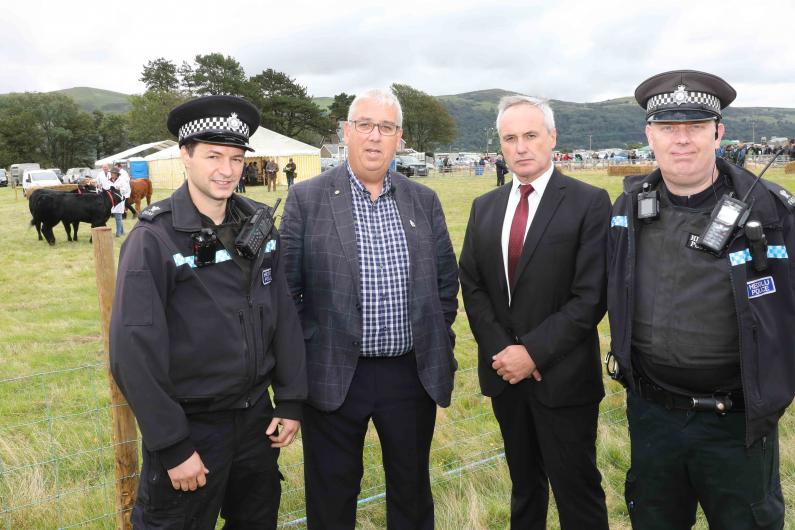Date

A crack team of rural crimefighters is being beefed up, it’s been revealed.
Three extra police constables will be added to the North Wales Rural Crime Team of four PCs and three Police Community Support Officers headed by team manager Rob Taylor, bringing its numbers up to 11 officers.
The announcement was made by North Wales Police and Crime Commissioner Arfon Jones at the Meirioneth County Show in Harlech.
The move was hailed as “excellent news” by Farmers’ Union of Wales president Glyn Roberts.
The team is also using high tech methods to combat rural crime, including drones and plans in place to introduce Automatic Number Plate Recognition cameras on the road between Dolgellau and Barmouth.
Experts say the pioneering task force has set a benchmark for policing the countryside in the UK.
Last year they established a partnership with their counterparts in Dyfed-Powys who set up a team modelled on the North Wales operation.
Their effectiveness can also be gauged by the fact that while rural crime is on the increase in England where it has risen 20 per cent, Wales is bucking that trend with a seven per cent reduction.
The team remains hard-worked though with 73 current investigations ongoing and a string of court cases taking place.
Arfon Jones, a former police inspector who was brought up on a farm in the Harlech area, said: “North Wales is a huge rural area and we need to provide an equitable service for all the residents of the region.
While we are very successful in targeting the criminals committing a range of crimes from badger baiting to stealing tractors, quad bikes and livestock, we feel there is a need for greater capacity.
This is a field where North Wales is leading the way and the team led by Rob Taylor is doing a fantastic job and being recognised for the way they are dealing with rural crime and wildlife issues but it is vital to continue to support them.
They have also been integral to the formation of similar teams in Dyfed-Powys, with whom we work very closely, and in Gwent.
The extra staff in North Wales will mean that these partnerships and those neighbouring forces in England will be strengthened.
It is appropriate that I made the announcement in Harlech because the area has become something of a hotspot and one of the new officers will have a specific responsibility for policing the Meirionnydd area and the border with Dyfed-Powys.
The ANPR cameras being installed between Dolgellau and Barmouth will be able to read a registration number and instantly check it against database records of vehicles of interest. Police officers can intercept and stop a vehicle, check it for evidence and, where necessary, make arrests
It's important that we are not just reactive but that we are also proactive so that we can stop rural crime taking place before it happens.
Our rural areas are geographically very large so we need technology to help us in our fight against countryside crime and to catch to offenders.”
Rob Taylor, who was a police officer for 30 years, also manages the Dyfed-Powys team and he said: “When we started in 2014, we were one of the first specialised rural crime teams but now there are more than 20.
This increase in the size of the team is very important to us because we are facing growing demands and have been involved in three court cases in the last ten days, all successful prosecutions.
Rural crime fighting is old school policing mixed with modern technology. It’s about getting to know the communities you are operating in and having two-way conversations.
At the same time, we’re using sophisticated techniques like DNA profiling and intelligence-led policing to target the hotspots for rural crime.
They have four-wheel drive vehicles that can go anywhere and dash-cams to record everything and we equip our officers with laptops so they don’t have to go back to the police station to write up reports and can have instant access to information.”
The team also work closely with organisations like the Farmers’ Union of Wales, National Farmers’ Union, British Association of Shooting and Conservation and the Country Landowners’ Association.
Responding to the announcement, FUW President Glyn Roberts said: “Every year rural crime costs millions of pounds and causes untold anxiety to farmers and rural businesses. North Wales police been leading the way in making sure that rural crime is less attractive for those up to no good.
The fact that their rural crime team will now double in size, due to increased funding, is excellent news.
Other police forces across Wales should take note of their approach in supporting the rural community and we can only commend the Police and Crime Commissioner for his efforts and determination to make North Wales a safer place for us all.”
The theft of tractors, machinery and quad bikes is on the increase with many of the thieves coming from across the border and Wrexham and Denbighshire the crime hotspots.
Rob Taylor said: “We need manufacturers to upgrade their security systems on tractors and other vehicles because criminals can buy a tracker blocker for £10 and ship stolen vehicles out in containers and in a couple of days they’re in North Africa or Eastern Europe.”
Arfon Jones added: “The A55 makes for an easy in and out for criminals but there are other roads into the crime hotspots of Wrexham and Denbighshire areas that make them real rat runs for the criminals.
This is where number recognition cameras come into play and we’re looking at increasing their presence on these routes.”